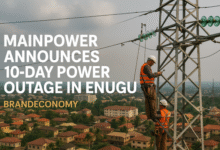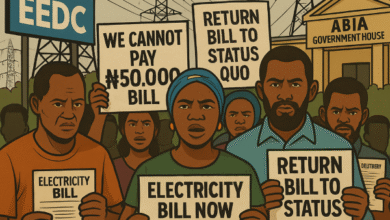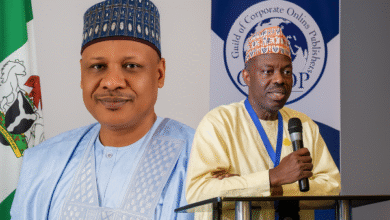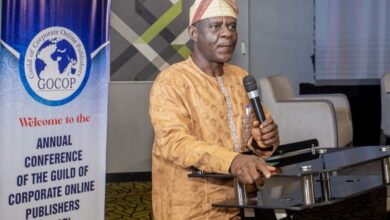Electricity: Labour demands complete reversal of power sector privatisation
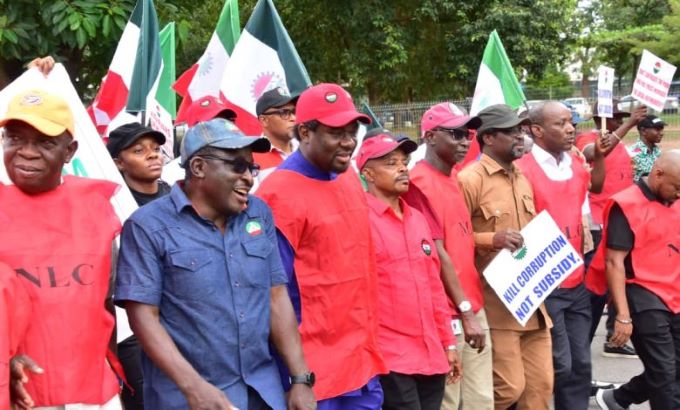 The Organised Labour has demanded for the complete reversal of the power sector privatisation and recovery of all public electricity assets sold.
The Organised Labour has demanded for the complete reversal of the power sector privatisation and recovery of all public electricity assets sold.
The Nigeria Labour Congress (NLC) and the Trade Union Congress (TUC) made the demands while picketing the headquarters of the Nigerian Electricity Regulatory Commission (NERC) over hike in electricity tariff on Monday in Abuja.
The protesting workers carried placards with inscriptions such as,’We are not generator Republic,’ IMF, World Bank, leave Nigeria Power Sector alone, “Let the poor breathe. Give us affordable and constant light, among others.
Mr Joe Ajaero, NLC President while addressing newsmen said that the privatisation of the power sector was a ‘colossal failure’.
BRANDPOWER reports that NERC had recently announced hike in electricity tariff across the nation from N65/kwh to N225/Kwh.
The organised labour had rejected the increase in the electricity tariff and therefore called for a reversal.
According to him, Organised Labour in Nigeria demands the complete reversal of the power sector privatisation and the recovery of all public electricity assets.
“That is which are sold cheap to largely inexperienced, technically deficient and financially challenged private investors.
“As workers are hit hardest by the increase in electricity tariff. Unlike business people, wage earning workers cannot adjust their income when the cost of utilities are increased.
“The stagnancy in wage amidst increases in electricity and refined petroleum products push workers over and beyond the limits of sanity and survival.
“Small and medium scale businesses which accommodates millions of workers in the informal economy is severally affected by the increases in energy cost.
“This have led to shutdown of business thus blooming Nigeria unemployment market,” he said.
He therefore, said that Nigeria workers rejected the recent increase in electricity tariff and the associated upgrading and downgrading of customers from one Band to another.
Ajaero further called on government to respect the Sept. 2021 agreement with Labour that reinforced in 2023 agreement that government must halt further increase in the tariff of public utilities until certain conditions were met.
He said that this include the review of the privatisation exercise, de- dollarization of gas supply to electricity generation, distribution of pre paid meters to all electricity consumers in Nigeria, among others.
The NLC president also noted that before the increase in electricity tariff, NERC would have called for a stakeholders meeting for proper consultation.
Mr Sanusi Garba, Chairman of NERC, commended Labour for its peaceful demonstration in respect of issues affecting the power sector.
According to him, we have taken input from your demands related to the affordability of the tariff issued by the commission, we have also listened to you and we have listened to the concerns of Nigerians.
“I want to assure you that we will make adequate representation on the policy side on the issue of affordability of tariffs.
“We also took note on your call for the diversification of energy sources and I will like to say that the Zukeru 700 mega watt power plant is already on,”he said.
BRANDPOWER reports that the organised labour also went to the Ministry of Power and Transmission Company of Nigeria (TCN).
Electricity tariff: New tariff capable of destroying nation’s economy – NLC
Distribution Companies exploiting electricity users in Nigeria, says labour unions
Also, the Nigerian Labour Congress (NLC) and Trade Union Congress (TUC), have accused Distribution Companies (DisCOs) of exploiting electricity users in Nigeria with their tariffs and high bills.
The labour unions stated this in Enugu on Monday during a protest at the Enugu Electricity Distribution Company (EEDC) office over the Band A tariff hike.
The News Agency of Nigeria (NAN) reports that labour leaders had over the weekend directed its members nationwide to picket Nigeria Electricity Regulation Commission (NERC) and Distribution Companies in their states until they reverse Band A tariff.
Union members, who protested and chatted solidarity songs at the EEDC office carried placards that read, “NERC and EEDC, Stop Electricity Tariff now”, “NERC Stop Banding electricity for Nigerians” and say “No to Hike in Electricity Tariff”.
Speaking during the protest, the State Chairman, TUC, Comrade Ben Asogwa, noted that many Nigerians were forced to pay for what they did not use through estimated bills by DISCOs.
Asogwa said that tariff increase was never solution to Nigeria ‘s problem stressing that Nigerians were currently faced with challenges of fuel subsidy removal and high cost of living.
He advised NERC and Enugu EEDC to stop the exploitation and reverse to status quo.
“In a country where there is a price regulations and government agency will increase tariff to over 240 per cent.We have not seen such even when things add money, it is done geometrically.
“Tariff increase is not a benefit to Nigerians and we want NERC and EEDC to reverse to status quo.
“EEDC says it invested money into the system but are not making profit. Anybody that is not making profit in business, should leave and let other organisation come,” he advised.
On his part, the State Chairman NLC, Comrade Fabian Nwigbo, said the labour was no longer comfortable with the hike in electricity tariff.
According to him, picketing of NERC and DisCo offices will continue nationwide until further notice.
He said, “We have come to register our grievances and we are coming back tomorrow; this place is going to be under lock and key until you remove all the bands.
“Nigerians are facing a lot of challenges already and now electricity tariff has been hiked to an unbearable price of N222 per unit.
“We are not going to tolerate bands in Nigeria or allow it in our country. Whether it is bands A or B, C or Z, we will not tolerate it.
“They said they are not working today because of Monday’s sit-at-home but by tomorrow, they will not work here until they remove the bands,” Nwigbo said.
BRANDPOWER reports that the no official of the EEDC received the protesters as the head office on Okpara Avenue was under lock and key apparently because of the Monday Sit at Home in the state.




